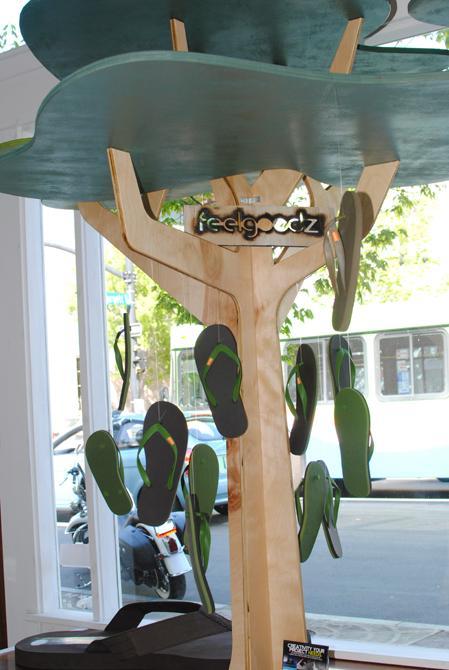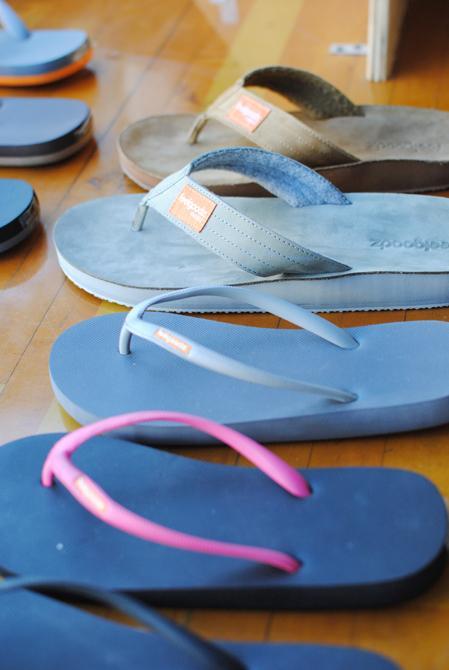Take a minute and look at your shoes.
Whether you’re wearing sneakers, flip-flops, high heels or moccasins, do you know what types of materials are in your shoes or who made them? For most of us, this information is something that we do not even consider when making our footwear purchases. However, these questions have helped shape the businesses that Mark Saad and Kyle Berner created, which have recently merged into one company: Feelgoodz .
Saad graduated from N.C. State with a degree in finance and entrepreneurship. He then created his own flip-flop company, focusing on creating a sustainable brand that was also socially conscious. Julie Whelan , a recent graduate in communication media and a minor in art studies, joined Saad in making sustainable flip-flops. Lizzie Gonzalez, a designer working for Roxy at the time, introduced Saad and Berner to each other, which eventually led to the merger.
“I thought they both needed each other, both in product and in business,” Gonzalez said. “They could cover a lot more ground working together, rather than as competitors.”
According to Gonzalez, Saad and Berner complemented each other both in strengths and weaknesses, making their merger mutually beneficial. Berner said he focused on the marketing and branding aspect of the company, but had to deal with the financial part too, which he was not as interested in.
This is where Saad complements Berner . Berner is the CEO and creator of the company and Saad is the chief financial officer. Whelan is now in charge of public relations and marketing. With Saad’s knowledge of the financial aspect of running a business and Berner’s marketing and branding talent, the two merged their separate companies in pursuit of a common mission: providing sustainable footwear while being socially conscious.
Gonzalez was very receptive to their mission and joined the team to lead product design. The inspiration for the flip-flop designs may not be what you would initially think. Gonzalez is a self-proclaimed “people-watcher.” She looks at what people are wearing, what people are looking for in fashionable footwear, and then designs the flip-flops accordingly.
Now, you may be wondering how Feelgoodz is sustainable and socially conscious, a question Berner and Saad would encourage you to ask since they value corporate transparency.
According to Gonzalez, the sandals are made in Vietnam, one of the only places where rubber trees are grown and harvested sustainably. Saad said the sandals are also made through fair trade co-ops, so you can be assured that underpaid sweatshop workers do not make the flip-flops.
With the recent merger, there is plenty of room for expansion, which both Saad and Berner see as a great opportunity. Saad said Feelgoodz is already growing rapidly and internationally, with business in Japan, Chile, New Zealand and China.
Domestically, the company’s main retailer is Whole Foods, but it plans to attract other retailers and continue to sell products online. According to Berner , they have a five to seven-year plan to reach $40-50 million in sales.
”We started with flip-flops and are now growing into a footwear brand,” Berner said. “We are going to have new models, a bigger team and more community activity.”
The Feelgoodz team is currently working on another project, a smartphone app that allows customers to view the transparency in their company, to see where everything comes from and how everything is made.
Feelgoodz currently has two product lines, one in the $20 range and one in the $40 range, with hopes of releasing new product lines soon.
Feelgoodz flip flops feature natural materials, such as rubber and plant-based dyes, which make the shoe organic and compostable. The Kinderz style flip flops, named for one of the original companies before the merger, have straps made with fiber created from recycled water bottles. Photo by Natalie Claunch









